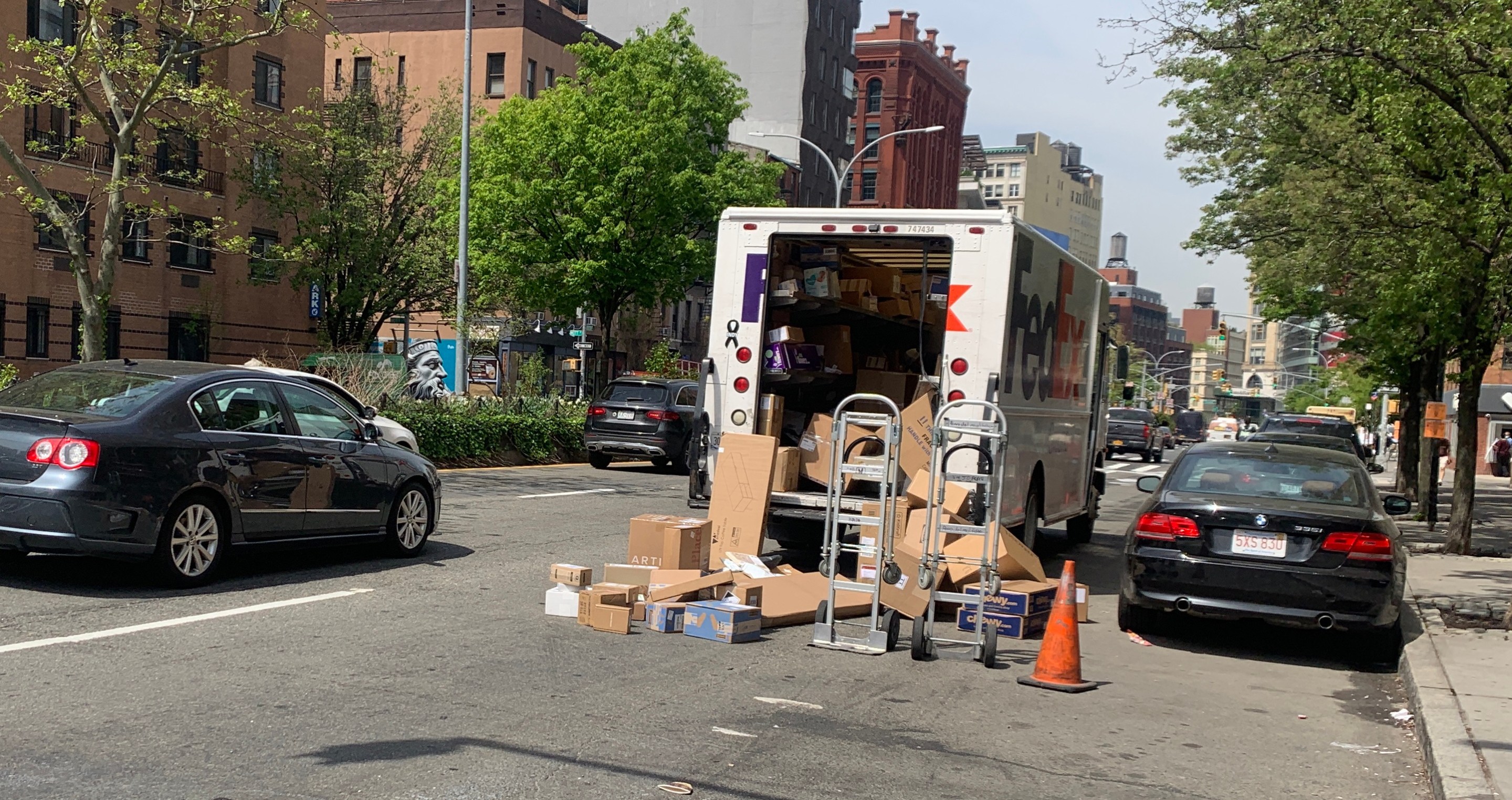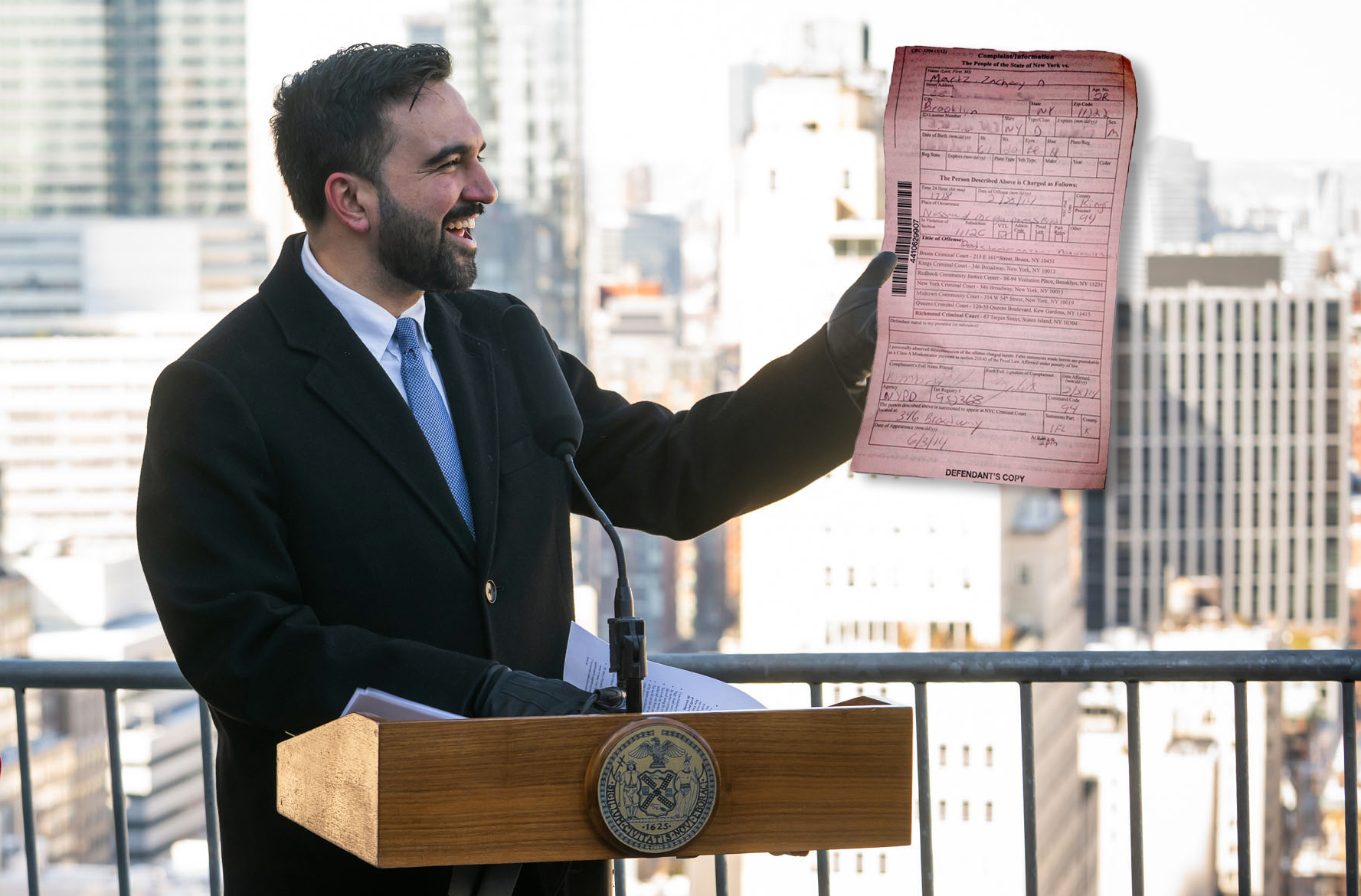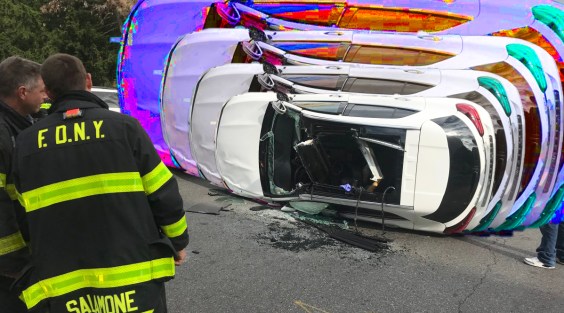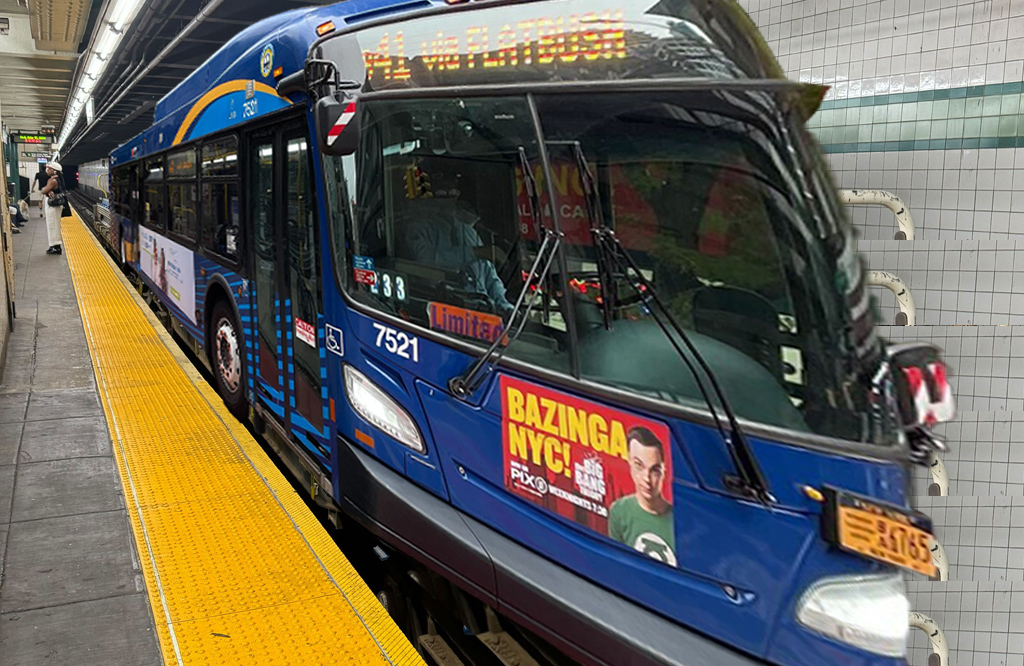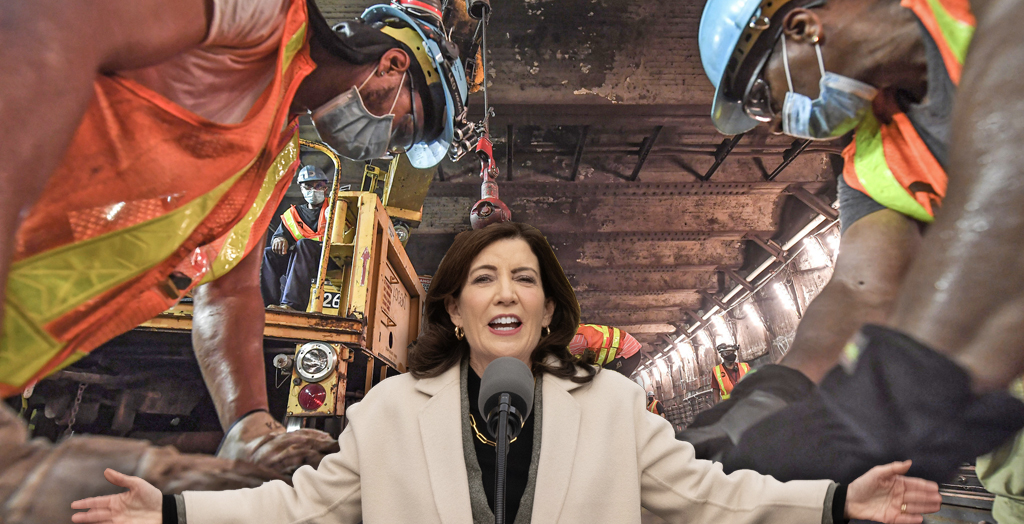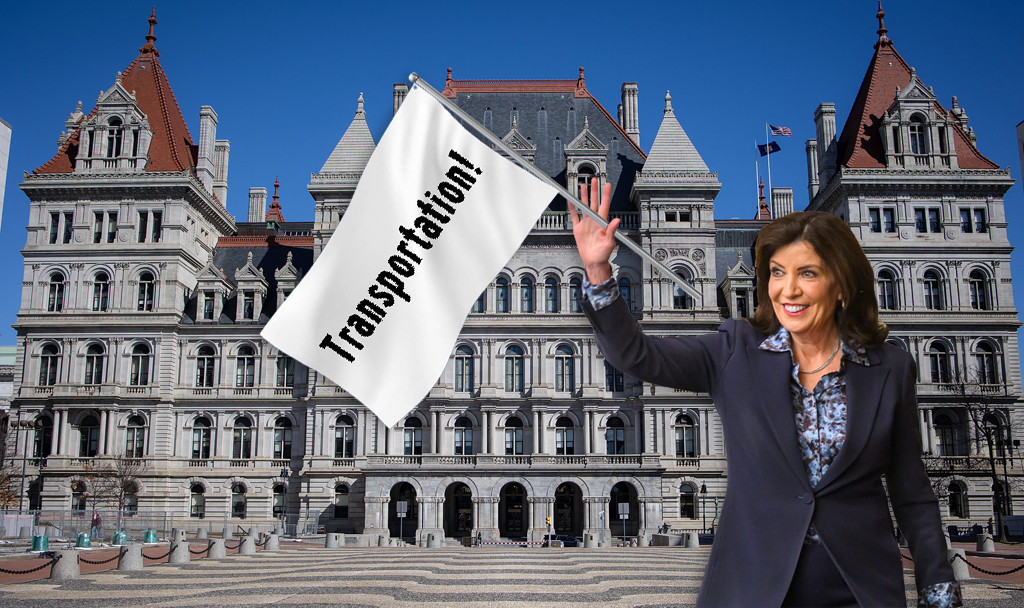It's another fine mess they've gotten us into.
The Adams administration is proposing to reduce by 5-20 percent the fines paid by some trucking firms for three dangerous parking violations as part of revisions of a program that then-Brooklyn Borough President Eric Adams said shouldn't even exist.
The reductions are part of the Department of Finance's plans for its Stipulated Fine Program, a Bloomberg-era initiative that allows enrolled trucking companies to pay far less for a wide variety of parking tickets in exchange for agreeing not to contest the tickets in court.
The city estimates that avoiding court battles over millions of tickets received by those 2,028 trucking companies saves the city tens of millions of dollars every year — but safety advocates, including one who shares the name with the current mayor — say that BBBB
"We shouldn't have the Stipulated Fine Program at all," Adams said back in 2018. "The top cause of accidents and congestion is double parking. These companies must do business, of course, but they shouldn't get a break when they violate rules that govern traffic safety."
But a break they will soon get. Buried near the bottom of the Department of Finance's must-read annual parking ticket report for the fiscal year that ended on June 30, tickets for parking in a bus lane — which cost non-enrolled companies $115 — will be reduced from $100 to $95 for participants in the Stipulated Fine Program.
Failing to pay for metered parking will drop $5. And double-parking — which is also $115 for non-enrolled firms — will drop from $80 to $65.
The double-parking and bus lane reductions raised the eyebrows of one trucking company consultant who requested anonymity because they work closely with city officials.
"Companies in the Stipulated Fine Program don't have any incentive to not double-park or park in bus lanes as it is because they know they will pay the reduced amount — and now, Finance is proposing to make it even cheaper! Not to mention what will happen to bus lanes!"
As evidence, the consultant referred to the city's own report on parking tickets. Truckers in the Stipulated Fine Program received 57,084 double-parking tickets last year, comprising 8.3 percent of their overall tickets. But for firms outside the program, double-parking tickets as a percentage of all tickets was just 3.5 percent. (Bus lane ticket percentages were much closer to parity among the separate fleets.)
"The firms not enrolled in Stipulated Fine were issued dramatically fewer double parking tickets because they know they have to prove in court that they were engaged in an expeditious delivery, which requires evidence, time receipts, etc.," the consultant said. "It just doesn't seem to make any sense that the city is willing to make it cheaper for these corporations to park illegally."

** Guilty rate shown on the left is for the area of 96th Street and below in Manhattan and the guilty rate shown on the right is for the area above 96th Street in Manhattan and all other boroughs.Chart: Department of Finance
According to the city, it actually does. Fleets enrolled in the program racked up $60.7 million in tickets in fiscal year 2024, and those tickets were reduced by $14.6 million — for a reduction of about 24 percent. Fleets not enrolled in the program had about 26.6 percent of their tickets dismissed outright, so by those numbers, the Stipulated Fine Program gets the city more money than it loses.
And 99.1 percent of those reduced Stipulated Fine tickets are actually paid. Rough 89 percent of tickets accrued by non-participants are actually paid, the report said.
A Department of Finance spokesman pushed back on the idea that reducing fines for flagrant dangerous parking is some kind of handout to the trucking industry.
"This is a mischaracterization of how fines are collected and adjudicated in New York City," said the spokesman, Ryan Lavis. "If they choose to waive their right to a hearing, [Stipluated Fine] participants agree to pay a set amount for each ticket. That amount is set by how many fines get dismissed for a particular violation during hearings. So, if the base fine for a particular violation is $100, and that violation is dismissed in 15 percent of hearings, then the stipulated fine amount will be set at $85. ... The city ends up collecting about the same amount it would if these companies went through the hearings, but saves taxpayers by cutting down on the number of hearings held each year."
The consultant disputed those numbers — again using the city's own report.
"If the fines are supposed to mimic what happens in court, then they should be raising the cost of bus lane violations, not making them cheaper," the consultant said, citing data showing that Stipulated Fine participants had their "No standing – bus stop" violations decreased by 12.90 percent vs. only 3.94 percent of non-participants.
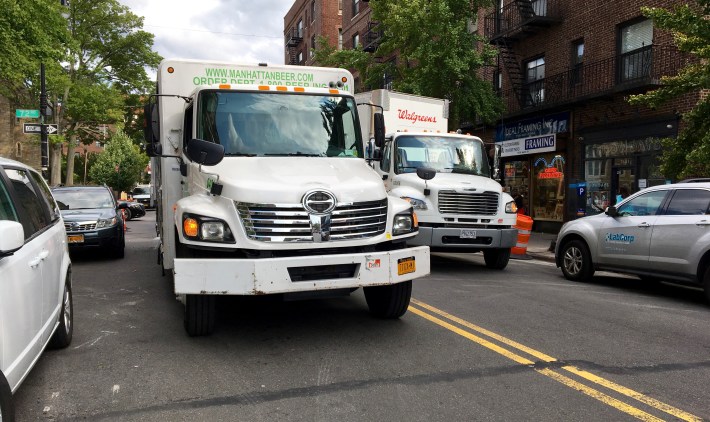
The Department of Finance had a response to that, too.
"If fine amounts in the Stipulated Fine Program are set at rates that are higher than the rate at which [non-participants] could expect to see tickets upheld in a hearing, many participants might opt to have their tickets adjudicated, which would require an increase in the number of hearings and judges needed to hear cases, thus costing taxpayers more," Lavis said.
Still, a $5 to $15 reduction in the fines paid by Stipulated Fine participants would reduce more than $1 million in revenue if nothing else changed, based on the Department's own numbers:
Money isn't the issue, said a former official in the Department of Transportation.
"The cuts are pretty small in city budget terms, but rather than tinker with the mechanics of massive, chronic illegal parking, it would be great if smart people in city government at some point took a look at why the city is completely ineffective in deterring that behavior and developed a plan to deliver clear and safe streets," said Jon Orcutt, a Bloomberg-era official who now advocates for Bike New York.
And Elizabeth Adams, the co-interim executive director of Transportation Alternatives, channeled then-Brooklyn Borough President Eric Adams.
“The Stipulated Fine Program shouldn’t even exist — but instead of scrapping the program, this proposal would make it even easier and cheaper to flout traffic laws," she said. "New York City has the slowest buses in America and the most traffic in the world, and this program only makes our buses slower, our air dirtier, and our streets more dangerous."
